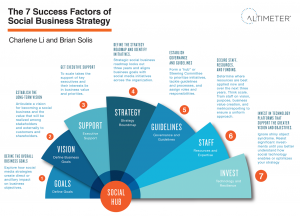The Seven Success Factors of Social Business Strategy
1. Define the overall business goals.
You can’t align your social strategy with your business objectives if you don’t even know what your objectives are.
2. Establish the long-term vision.
If you’re not striving toward the end goal, you’re likely to veer off the path. If you want your team to fully invest in your social strategy — and you need the support of your entire team – you’ll need to communicate your vision with clarity and passion.
3. Ensure executive support.
In the early days you may be able to fly under the radar, but at some point, if you want to truly have an impact on the business, you’ll need the backing and support of key executives.
4. Define the strategy roadmap.
You already know your business objectives and have a clear vision. But how are you going to get there? Plan out your route, what roads you’ll travel, and what roads you’ll avoid.
5. Establish governance and guidelines.
Who is responsible for executing the social strategy? What’s your process of listening and responding to your customers? If you clearly define this process and then stick to it, you’ll spend less tie floating along throughout the social sphere and more time strategizing your social growth.
6. Secure staff, resources, and funding.
In the early stages of social growth, you might outsource your social media campaign to an agency, and that’s fine. But you should also be looking down the road and planning to develop internal resources to take your company to the next level as your social prowess — and your business — grows.
7. Invest in technology platforms that evolve.
Resist the temptation to jump on the latest technology bandwagon before you have a long-term strategic plan in place. Hold off on making significant technology investments until you’re equipped with a sound vision and strategic plan.
via The 7 Success Factors of Social Business Strategy [INFOGRAPHIC] – Brian Solis.


![The 7 Success Factors of Social Business Strategy [INFOGRAPHIC] The 7 Success Factors of Social Business Strategy [INFOGRAPHIC]](http://yiblab.com/wp-content/uploads/bfi_thumb/dummy-transparent-mr6axjmyxr7flqzo640shtgfhf8kmjjhfrvpoxkhp0.png)

